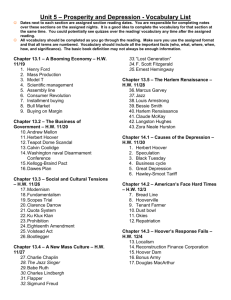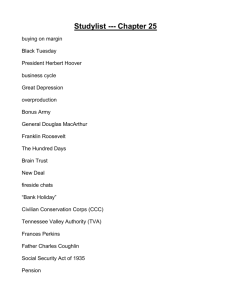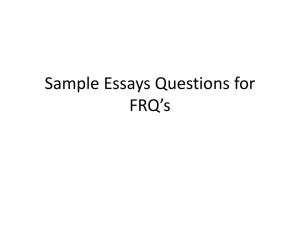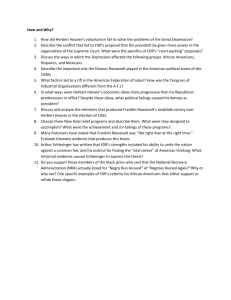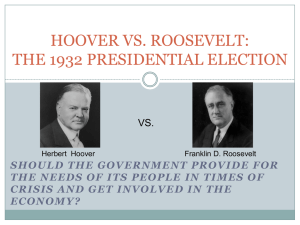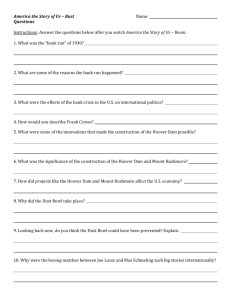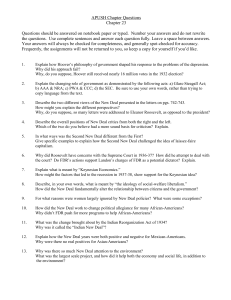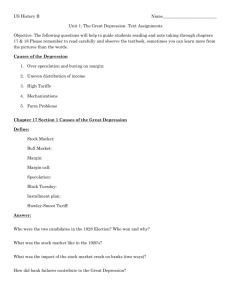Hoover and Roosevelt and the Great Depression Lesson
advertisement
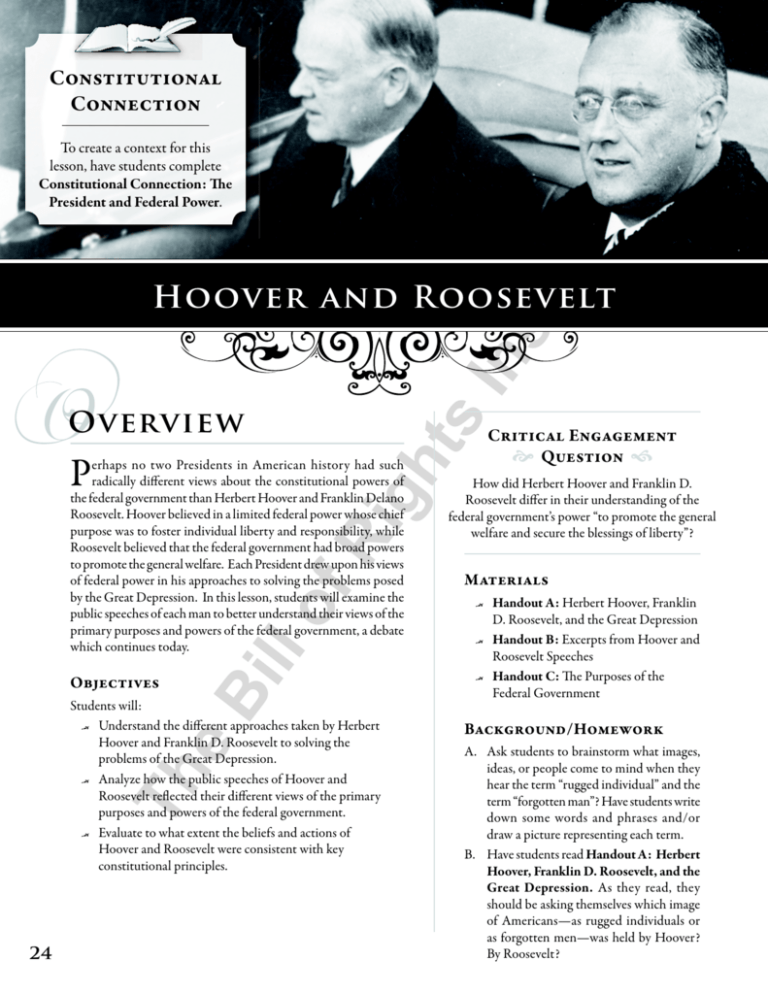
Constitutional Connection itu te To create a context for this lesson, have students complete Constitutional Connection: The President and Federal Power. In st Hoover and Roosevelt ts Overview ig h P Objectives Bi ll of R erhaps no two Presidents in American history had such radically different views about the constitutional powers of the federal government than Herbert Hoover and Franklin Delano Roosevelt. Hoover believed in a limited federal power whose chief purpose was to foster individual liberty and responsibility, while Roosevelt believed that the federal government had broad powers to promote the general welfare. Each President drew upon his views of federal power in his approaches to solving the problems posed by the Great Depression. In this lesson, students will examine the public speeches of each man to better understand their views of the primary purposes and powers of the federal government, a debate which continues today. Th e Students will: y Understand the different approaches taken by Herbert Hoover and Franklin D. Roosevelt to solving the problems of the Great Depression. y Analyze how the public speeches of Hoover and Roosevelt reflected their different views of the primary purposes and powers of the federal government. y Evaluate to what extent the beliefs and actions of Hoover and Roosevelt were consistent with key constitutional principles. Critical Engagement ö Question ö How did Herbert Hoover and Franklin D. Roosevelt differ in their understanding of the federal government’s power “to promote the general welfare and secure the blessings of liberty”? Materials y Handout A: Herbert Hoover, Franklin D. Roosevelt, and the Great Depression y Handout B: Excerpts from Hoover and Roosevelt Speeches y Handout C: The Purposes of the Federal Government Background/Homework A. Ask students to brainstorm what images, ideas, or people come to mind when they hear the term “rugged individual” and the term “forgotten man”? Have students write down some words and phrases and/or draw a picture representing each term. B. Have students read Handout A: Herbert Hoover, Franklin D. Roosevelt, and the Great Depression. As they read, they should be asking themselves which image of Americans—as rugged individuals or as forgotten men—was held by Hoover? By Roosevelt? Warm-Up [ 10 minutes ] _____________________________ A. Review the previous discussion about the “rugged individual” and the “forgotten man.” Ask students: According to Hoover, what role should the government play in the life of the “rugged individual”? Students may suggest: let him alone; support his efforts to benefit society; individuals are what make America great and the government should not interfere; provide equality of opportunity for individuals; promote his liberty; etc. B. According to Roosevelt, what role should the federal government play in the life of the “forgotten man?” Students may suggest: find him; care for him; require society to pool its collective resources to help him; provide for his welfare; etc. _____________________________ _____________________________ _____________________________ itu te _____________________________ _____________________________ _____________________________ D. F. Th e Bi ll E. of R ig h C. _____________________________ _____________________________ In B. Distribute one to two quote slips from Handout B: Excerpts from Hoover and Roosevelt Speeches to each student, as well as Handout C: The Purposes of the Federal Government. Point out to students that the phrases “promote the general welfare” and “secure the blessing of liberty” are taken from the Preamble to the Constitution and are considered to be two of the major purposes of the federal government. For each quote, they should answer the following questions: 1. Who do you think made this statement, Hoover or Roosevelt? How do you know? 2. Does this quote support the purpose of government as stated in Column A, Column B, or both? Students should write the number of the quote in the appropriate column on the Handout, along with a brief paraphrase. Students should circulate around the classroom, reading their quotes to each other and writing the number of the quote in the appropriate column. As students are circulating, post a large copy of Handout C at the front of the room. Once students have at least five quote numbers on their charts, reconvene as a large group, asking each student to read his/her original quote. Students should then tape the quote in the appropriate column on the large T-chart. (Quotes likely supporting liberty: 1, 4, 6, 8, 9, 12, 14, 15, 22, 23, 27, 28, 30, 31, 32, 34, 35, 37, 42; quotes likely supporting wellbeing: 2, 3, 5, 7, 10, 11, 13, 16, 18, 20, 21, 24, 25, 26, 29, 33, 36, 38, 41; quotes likely supporting both/ either: 17, 19, 39, 40.) Encourage discussion, especially if there is disagreement. Students should work with a partner to categorize the quotes in each column into five to seven key themes. Summary themes for Column A (liberty) might include: protect individual rights, limit government, encourage self-reliance, support private enterprise, provide equality of opportunity, ensure ordered liberty, secure the conditions for the pursuit of happiness, etc. Summary themes for Column B (well-being) might include: foster group security, promote social justice, increase government regulation, find the “forgotten man”, achieve the common good, ensure economic security, secure happiness, etc. ts A. st Activity [ 30 minutes ] _____________________________ _____________________________ _____________________________ _____________________________ _____________________________ _____________________________ _____________________________ _____________________________ _____________________________ _____________________________ _____________________________ _____________________________ _____________________________ _____________________________ _____________________________ _____________________________ Wrap-Up [ 10 minutes ] _____________________________ Ask students to consider the following questions, accepting all reasoned responses: y If the main purpose of the federal government is to secure and preserve liberty, how can the President and the citizens ensure that people’s welfare (well-being) is protected? y If the main purpose of the federal government is to promote the general welfare (well-being), how can the President and the citizens ensure that individual liberty is preserved? y If both of these purposes are equally important, how do we strike a balance between them when the nation is faced with economic, social, or political challenges? _____________________________ Homework _____________________________ _____________________________ itu te _____________________________ _____________________________ st _____________________________ _____________________________ ig h ts In A. Have students make a digital or paper collage of images and phrases which reflect Hoover’s ideal of the “rugged individual” or Roosevelt’s image of the “forgotten man.” B. Write a two to three page mini-play in which Hoover and Roosevelt debate how to solve the problems of the Depression. The dialogue should reflect Hoovers’s commitment to government’s role in securing liberty and Roosevelt’s commitment to government’s role in promoting the general welfare. C. Answer one (or all) of the questions posed in the Wrap-Up in a wellconstructed three to five paragraph essay per question. _____________________________ of R Extensions Bi ll Imagine that it is December, 1932—the period between Hoover’s defeat and Roosevelt’s inauguration. Have students assume the persona of either Hoover or Roosevelt, and write a letter to the other with advice about/plans for dealing with the problems of the Depression. (Note: Such a correspondence actually took place. See pgs. 154-160 of Gordon Lloyd’s The Two Faces of Liberalism: How the Hoover-Roosevelt Debate Shapes the 21st Century (M & M Scrivener Press, 2007.) The Issues Endure Th e Students should research/review a significant contemporary social or political issue, e.g. health care, education, the War on Terror. Students should write a multi-paragraph essay analyzing how Hoover might deal with the issue; how Roosevelt might deal with the issue; and then assess whose approach is more consistent with constitutional principles. _____________________________ _____________________________ _____________________________ _____________________________ _____________________________ _____________________________ _____________________________ _____________________________ _____________________________ _____________________________ _____________________________ _____________________________ _____________________________ _____________________________ _____________________________ _____________________________ Herbert Hoover, Franklin D. Roosevelt, and the Great Depression y y In y itu te y st y not to cut production or lay off workers Asked Congress to increase spending on public works projects and to increase funding for banks to prevent mortgage foreclosures Created the Reconstruction Finance Corporation Encouraged farmers to voluntarily cooperate to raise prices Promoted voluntarism as a way to ease the crisis Avoided spending large amounts of federal money so as not to increase the public debt But these efforts by the federal government did not stem the economic disaster. By 1932, the unemployment rate was twenty-five percent. Homeless people lived in shanty-towns called “Hoovervilles” in many cities, and the Gross National Product had fallen from a high of over $100 billion in 1929 to $55 billion. Challenging Hoover in the Presidential campaign of 1932 was the Democratic nominee, Franklin Delano Roosevelt. He projected a positive, energetic, and imaginative image, promising the American people a “new deal.” FDR stated that the economic condition of the country was a bigger emergency than the nation had faced upon entering World War I. He charged the Hoover administration with having ignored “the forgotten man at the bottom of the economic pyramid.” He believed that that the nation’s economic woes were the result of too much influence by a small group of wealthy men motivated by selfish goals. Their exercise of property rights had interfered with the liberty of individuals, and government Th e Bi ll of R ig h n 1928, Herbert Hoover believed the nation would continue to prosper. As a candidate for President, he opposed regulating business, but supported business through tariff policies, a balanced budget, and the promotion of scientific research and foreign trade. He believed that a good education and a government protecting individual liberties makes it possible for everyone to succeed. Influenced by his humanitarian work after WWI, Hoover trusted voluntary organizations to meet the needs of the poor and help them become self-supporting. Economic, political, and social justice depended on limiting the actions of the central government. Individuals and organizations were the forces for social and economic change. These ideals were reflected in his Inaugural Address. However, eight months after Hoover’s inauguration, the economy collapsed. The stock market crash of October 1929 signaled serious underlying problems in the economy. Business failures, home foreclosures, bank closures, and spiraling unemployment rippled across the nation. At first Hoover believed that this downturn was similar to the periodic recessions that were typical of the American business cycle. About a year later, Hoover acknowledged the Depression. He again spelled out his commitment to voluntary, community-based solutions. However, he also pointed out that the federal government was working to promote people’s well-being through large-scale public works projects. Hoover took the following actions in response to the depression: ts I y Encouraged businessmen ©The Bill of Rights Institute Herbert Hoover and Franklin D. Roosevelt ts In st itu te help farmers, laborers, and the unemployed made up the Second New Deal. Though the economy was far from healthy after four years of the New Deal, (the unemployment rate in 1936 was still seventeen percent), Roosevelt won over sixty percent of the popular vote in the 1936 Presidential Election. In his Second Inaugural Address, Roosevelt explained that the Constitution was sufficient to solve the problems of increasingly complex civilization. In expanding the reach of the federal government to solve economic problems, he asserted that Americans were “writing a new chapter in our book of selfgovernment.” But Americans were not, he said, changing the essential foundations established in 1789. Throughout the 1930s, Herbert Hoover continued to speak out about his opposition to the New Deal. He championed his belief in an America whose foundations were individual liberties, limited governments, and self-reliant, responsible citizens. Roosevelt continued to support legislation and executive actions which promoted the general welfare, increased the role of government in the lives of individuals, and sought to achieve social justice through federal action. The debate over the federal government’s commitment to “promote the general welfare and secure this blessings of liberty to ourselves and our posterity” (as well as to whether the actions of either President shortened or prolonged the Depression) continues today. Th e Bi ll of R ig h had to intervene in order to protect the less fortunate. He supported government planning for social and economic problems. Roosevelt easily won the election in November of 1932 with almost sixty percent of the popular vote. In his First Inaugural Address, he encouraged the American people to find hope in their history of overcoming obstacles. He stated that “the only thing we have to fear is fear itself.…” Roosevelt praised the Constitution’s balance between executive and legislative authority. But he stated that he was prepared to ask Congress for more power to deal with the emergency, just as would be the case in the event of a military attack. His plan was one of government action to bring about immediate relief, short-term recovery, and longterm reform. In the first hundred days of the new administration, Congress quickly approved a wide variety of programs called the First New Deal. The Federal Deposit Insurance Corporation, National Industrial Recovery Act, Civilian Conservation Corps, Public Works Administration, and Tennessee Valley Authority were among the major pieces of legislation. All significantly increased the role and the size of the federal government. After the 1934 election, Roosevelt worked to extend New Deal reforms through measures designed to provide more benefits to the “forgotten man.” Extensive public works projects, the Social Security Act, increased income taxes on the wealthy, and several programs intended to ö Critical thinking questions õ 1. According to each President, who could best bring about social and economic change? 2. What actions did each President take to respond to the Great Depression? 3. Roosevelt asserted that the expanded reach of the federal government to solve economic problems was not an essential change to the Constitution. Do you agree? Why or why not? 4. In what ways did each President believe that the federal government should “promote the general welfare and secure the blessings of liberty to ourselves and our posterity”? Presidents & the Constitution, Volume II ©The Bill of Rights Institute B Excerpts from Hoover and Roosevelt Speeches These unhappy times call for the building of plans … that put their faith once more in the forgotten man at the bottom of the economic pyramid. As I see it, the task of government in relation to business is to assist the development of an economic declaration of rights, an economic constitutional order. Government should not engage in business in competition with its citizens. The responsible heads of finance and industry, instead of acting each from himself, must work together to achieve the common good. It is the duty of business to conduct itself so that government regulation or government competition is unnecessary. The public must be protected from any domination or from predatory business. Th e of R ig h ts In st It is the duty of government to avoid regulation as long as equal opportunity to all citizens is not invaded and public rights violated. Bi ll itu te Directions: Distribute one or two speech excerpts to each student and follow the directions for the Activity. ©The Bill of Rights Institute Herbert Hoover and Franklin D. Roosevelt The government should assume the function of economic regulation only as a last resort. itu te Equality of opportunity is the right of every American. This ideal of individualism based upon equal opportunity of every citizen is the negation of socialism. Equality of opportunity is a fundamental principle of our nation. If we are to go forward, we must move as a trained and loyal army willing to sacrifice for the good of a common discipline. Every step of bureaucratizing of the business of our country poisons … political equality, free speech, free assembly, free press, and equality of opportunity. We are, I know, ready and willing to submit our lives and our property to [military-like discipline], because it makes possible a leadership which aims at the larger good. Bi ll of R ig h ts In st Government in this regard is the maintenance of a balance, within which every individual may have a place if he will take it; in which every individual may find safety if he wishes it; in which every individual may attain such power as his ability permits, consistent with his assuming the accompanying responsibility. Economic freedom cannot be sacrificed if political freedom is to be preserved. Th e Presidents & the Constitution, Volume II ©The Bill of Rights Institute Our Constitution is so simple, so practical that it is possible always to meet extraordinary needs by changes in emphasis and arrangement without loss of essential form. Confidence and courage are the essentials of success in carrying out our plan. The true conservative seeks to protect the system of private property and free enterprise by correcting such injustices and inequalities as arise from it. We are nearer today to the ideal of the abolition of poverty and fear from the lives of men and women than ever before in any land. By using the new materials of social justice we have undertaken to erect on the old foundations a more enduring structure for the better use of future generations. st In ts ig h of R Bi ll I see one-third of a nation ill-housed, ill-clad; ill-nourished. Th e itu te The very essence of equality of opportunity and of American individualism is that there shall be no domination by any groups or combination in this republic, whether it be business or political. The preservation of self-government; the perfection of justice whether in economic or in social fields; the maintenance of order liberty; the denial or domination by any group or class; the building up and preservation of equality of opportunity; the stimulation of initiative and individuality … [are American ideals.] ©The Bill of Rights Institute Herbert Hoover and Franklin D. Roosevelt Economic depression cannot be cured by legislative action or executive pronouncement. The federal government is engaged upon the greatest program of waterway, harbor, flood control, public building, highway, and airway improvement in all our history. In our personal ambitions we are individualists. But in our seeking for economic and political progress as a nation, we all go up; or else we all go down, as one people. Some new plan is needed to our economic life … to organize concerted plans for the better use of our resources. It is not an issue as to whether people shall go hungry or cold in the United States. It is solely a question of the best method by which this hunger and cold shall be prevented. The opening of the doors of the federal treasury is likely to stifle private giving and thus destroy far more resources than the proposed charity from the government. ts ig h of R Bi ll Our greatest primary task is to put people to work. The [New Deal methods and objectives] are an attempt to fasten upon the American people some sort of a system of personal government, of a government of laws; a system of centralization under a political bureaucracy; a system of debt; a system of inflation; a system which would stifle the freedom and liberty of men. Th e In st itu te Presidents & the Constitution, Volume II ©The Bill of Rights Institute These gigantic plans of a dictated economy … were undertaken in disregard of the Constitution. This is a conflict between a philosophy of orderly individual liberty and a philosophy of government dictation. Americans must forswear that conception of the acquisition of wealth which, through excessive profits, creates undue private power over private affairs and, to our misfortune, over public affairs as well. It is the spirit of liberty which made … the Constitution. There must never be confusion in the Bill of Rights, the balance of powers, local government, and a government of laws, not men. I stated that our first job was to restore men to work. Either we shall have a society based upon ordered liberty and the initiative of the individual, or we shall have a planned society that means dictation, no matter what you call it or who does it. Bi ll of R ig h ts In st itu te All emergency works shall be united in a single, new, and greatly enlarged plan. This generation of Americans has a rendezvous with destiny. Freedom both requires and makes increased responsibilities. Th e ©The Bill of Rights Institute Herbert Hoover and Franklin D. Roosevelt It is the Supreme Court defending the people’s rights and securities guaranteed by the Constitution which time and again has protected the people from those who seek for economic power or political power, or to suppress free worship and free thoughts. In Hoover excerpts taken from the following: st itu te Labor Day symbolizes our determination to achieve an economic freedom for the average man which will give his political freedom reality. of R ig h ts y Presidential Nomination Acceptance Address (August 11, 1928) y Campaign Speech (October 22, 1928) y Inaugural Address (March 4, 1929) y Second Annual Message to Congress (December 2, 1930) y Statement to the Press (February 3, 1931) y Lincoln Birthday Dinner Address (February 12, 1936) y Crisis to Free Men Speech ( June 10, 1936) y Hands Off the Supreme Court Speech (February 20, 1937) Hoover excerpts are numbers 1, 4, 6, 7, 8, 12, 14, 15, 19, 22, 23, 24, 27, 28, 30, 31, 32, 34, 35, 36, 37, 40, 42 Roosevelt excerpts taken from the following: Th e Bi ll y Address to Conference of Governors ( June 2, 1931) y The Forgotten Man Radio Address (April 7, 1932) y Commonwealth Club Address (September 23, 1932) y First Inaugural Address (March 4, 1933) y First Fireside Chat (March 12, 1933) y Annual Message to Congress ( January 4, 1935) y The Dignity of Labor Speech (September 6, 1936) y Second Inaugural Address ( January 20, 1937) Roosevelt excerpts are numbers 2, 3, 5, 9, 10, 11, 13, 16, 17, 18, 20, 21, 25, 26, 29, 33, 38, 39, 41 Presidents & the Constitution, Volume II ©The Bill of Rights Institute The Purposes of the Federal Government st Both The main purpose of the federal government is to promote and preserve well-being. Th e Bi ll of R ig h ts In The main purpose of the federal government is to secure and preserve liberty. itu te Directions: You will be given 1-2 quotes from statements by either Hoover or Roosevelt. For each quote, ask yourself, “Does this quote support the statement in Column A? Column B? both?” Write the number of the quote in the appropriate column, along with a brief paraphrase. (If the quote supports both statements, write the number/paraphrase in the middle.) ©The Bill of Rights Institute Herbert Hoover and Franklin D. Roosevelt
